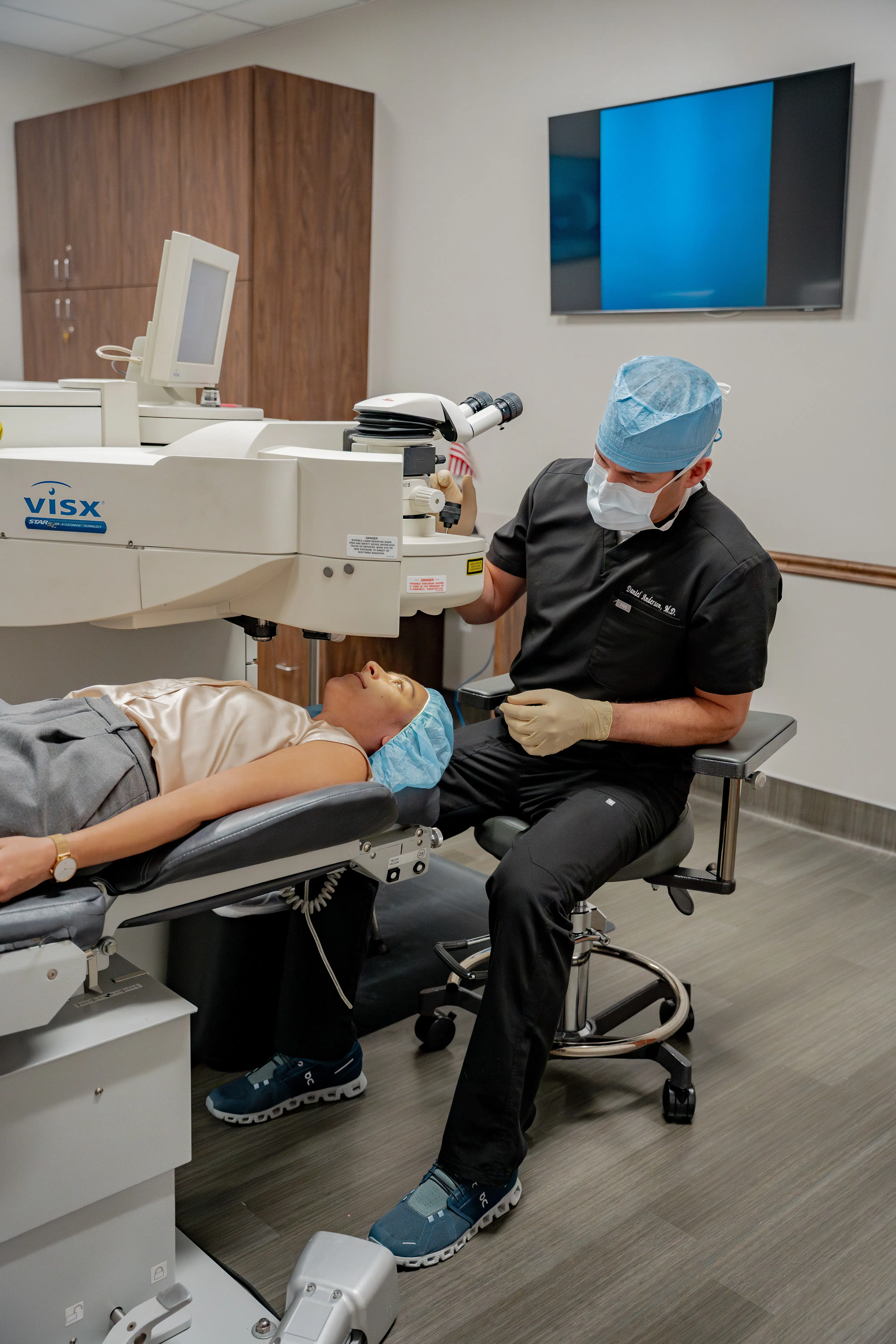Frequently Asked Questions About LASIK Eye Surgery in Houston
Considering LASIK vision correction is a significant decision, and it’s natural to have questions! At Berkeley Eye Center, we believe informed patients make the best decisions about their eye health. We’ve compiled answers to some of the most common questions our Houston patients ask about the LASIK procedure, recovery, costs, and more.
If you don’t see your question answered here, we encourage you to schedule a free LASIK consultation where our team can address your specific concerns.
On This Page
About the LASIK Procedure
What exactly is LASIK eye surgery?
LASIK (Laser-Assisted In Situ Keratomileusis) is a refractive surgery that uses a precise laser to reshape the cornea (the clear front part of the eye). This corrects how light focuses on the retina, improving vision for people with nearsightedness (myopia), farsightedness (hyperopia), and astigmatism, often reducing or eliminating the need for glasses or contacts.
Is the LASIK procedure painful?
The procedure itself is generally considered painless. We use numbing eye drops (topical anesthetic) and may offer oral medication to help you relax and feel comfortable. You might feel slight pressure during flap creation, but not pain. Most patients report little to no discomfort afterward.
How long does the LASIK procedure take?
While you can expect to be at our dedicated Surgery Center for about two hours on the day of your procedure (including prep and initial recovery), the time spent in the surgery suite with the doctor is typically only 15-20 minutes. The actual laser treatment time is remarkably fast – often around one minute per eye.
Are you awake during LASIK?
Yes, patients are awake during the LASIK procedure. Your eyes are numbed with drops, and you may receive a mild sedative to help you relax. You’ll be asked to focus on a target light during the brief laser application. Our team guides you through every step.
Can both eyes be done at the same time?
Yes, due to the advanced technology and safety profile of modern LASIK, most patients have both eyes treated during the same procedure session. This is generally preferred for convenience and balanced visual recovery. Your surgeon will confirm the best approach for you.
What kind of laser technology does Berkeley Eye Center use?
We are committed to investing in proven, state-of-the-art technology for optimal safety and results. Berkeley Eye Center utilizes advanced Excimer laser systems (like the VISX STAR S4 IR) and offers the “All-Laser LASIK” experience using the bladeless Intralase femtosecond laser for precise flap creation.
Candidacy & Eligibility
How do I know if I am a candidate for LASIK?
While general guidelines exist (age 18+, stable vision, good eye/general health, prescription within range), the only definitive way to know is through a comprehensive eye exam and consultation. Factors like corneal thickness, specific eye conditions (like Keratoconus or severe dry eye), and overall health are carefully evaluated.
Are all patients who wear glasses or contacts candidates for LASIK?
Most people who wear glasses or contacts are good candidates, especially those with mild to moderate nearsightedness, farsightedness, and/or astigmatism. However, suitability depends on the individual factors mentioned above. For very high prescriptions or certain eye conditions, alternatives like EVO ICL or PRK might be better options.
Do I need to stop wearing contact lenses before my LASIK consultation/surgery?
Yes. Contact lenses can temporarily alter the shape of your cornea. To ensure the most accurate measurements for treatment planning, you will need to stop wearing them for a period before your consultation and before the surgery itself. The required duration depends on the type of lens:
– Soft Contact Lenses: Typically stop wearing 2 weeks prior.
– Hard or Gas Permeable (RGP) Lenses: Typically stop wearing at least 4 weeks prior (sometimes longer).
Your counselor will give you specific instructions.
Vision Results & Longevity
What kind of vision can I expect the day after surgery?
Many patients notice significantly improved vision almost immediately after the procedure or by the next morning. Vision is often functional without glasses/contacts at the one-day post-op exam. Visual acuity typically continues to sharpen during the first week.
How long does LASIK last? Is it permanent?
LASIK permanently reshapes the cornea. In that sense, the effects are considered permanent. However, LASIK does not prevent normal age-related changes to the eye, such as:
– Presbyopia: The natural loss of reading vision, typically starting in one’s 40s, which may eventually require reading glasses.
– Cataracts: Clouding of the eye’s natural lens later in life, which requires cataract surgery.
While rare, minor prescription changes can occur over many years. Enhancements are possible if needed and medically advisable.
Does LASIK correct reading vision (presbyopia)?
Standard LASIK primarily corrects distance vision errors (nearsightedness, farsightedness, astigmatism). It does not directly correct presbyopia, the age-related need for reading glasses. Some patients opt for a “monovision” LASIK approach (correcting one eye for distance, one for near), or may consider alternatives like Refractive Lens Exchange (RLE) if reducing dependence on reading glasses is a primary goal. This is discussed during the consultation.
Recovery & Aftercare
How long is the LASIK recovery process?
Initial recovery is very fast for most patients. You’ll likely notice improved vision immediately or by the next day. Discomfort is usually minimal and short-lived. Key milestones:
Day 1: Follow-up appointment, usually functional vision without correction.
First Few Days: Vision continues to stabilize; may experience temporary dryness, light sensitivity. Follow eye drop schedule strictly.
Week 1: Most normal activities (work, driving) resumed. Avoid eye makeup, dusty environments.
Weeks/Months: Continue using lubricating drops as advised. Avoid swimming/hot tubs/contact sports for specified periods (ask your doctor). Vision fully stabilizes, typically within 3 to 6 months.
How much work will I miss after LASIK?
Most patients return to work and normal daily activities the day after their procedure. Some prefer to take an extra day or two. Your refractive counselor can provide guidance based on your job type.
What are the restrictions after LASIK?
You’ll need to follow specific instructions, including:
Using prescribed eye drops (antibiotic/steroid/lubricating).
– Wearing protective eye shields while sleeping for the first week or so.
– Avoiding rubbing your eyes.
– Avoiding swimming pools, hot tubs, lakes, oceans for several weeks.
– Avoiding dusty/smoky environments initially.
– Refraining from eye makeup for about a week.
– Wearing sunglasses outdoors.
– Attending all scheduled follow-up appointments (crucial!).
Safety, Risks & Side Effects
Is LASIK eye surgery safe? What are the risks?
LASIK is considered one of the safest elective surgical procedures available, with a very high success and patient satisfaction rate (often cited above 90-95%). However, like any surgery, it carries potential risks and side effects, though significant complications are rare with modern technology and experienced surgeons. Potential risks include:
Dry Eyes: The most common side effect, usually temporary and managed with lubricating drops. May persist longer in some individuals.
Visual Symptoms: Temporary glare, halos around lights (especially at night), starbursts, or double vision. These typically diminish significantly during the healing period.
Under/Overcorrection: Vision may not be perfectly corrected, potentially requiring glasses/contacts for certain tasks or (rarely) an enhancement procedure.
Flap Complications: Extremely rare with modern femtosecond laser flap creation, but possible issues include flap wrinkles or epithelial ingrowth.
Infection/Inflammation: Very rare, but possible with any surgery. Minimized by following post-op drop instructions.
Our team discusses benefits, risks, and side effects thoroughly during your free consultation.
What are common LASIK side effects?
The most common side effects are temporary and part of the normal healing process:
– Dry eye sensation (managed with artificial tears).
– Light sensitivity.
– Glare or halos around lights, especially at night (usually improves over weeks/months).
– Mild scratchiness or foreign body sensation initially.
– Fluctuating vision during the initial healing period.
Cost & Insurance
Does insurance cover LASIK? How much does it cost?
Most insurance plans consider LASIK elective and do not cover it. Some vision plans offer discounts. Berkeley Eye Center offers one transparent price regardless of your prescription level, focusing on value through experience and technology. We also offer financing options (CareCredit, Alphaeon) and accept FSA/HSA payments.
LASIK vs. Other Procedures
What is the difference between PRK and LASIK?
Both PRK and LASIK use an excimer laser to reshape the cornea. The main difference is how the inner corneal tissue is accessed:
LASIK: Creates a thin flap on the corneal surface, reshapes underneath, then repositions the flap. Recovery is typically faster with less initial discomfort.
PRK: Gently removes the outermost layer of the cornea (epithelium), reshapes the surface underneath, and the epithelium heals back over several days. Recovery takes longer with more initial discomfort, but it can be a better option for those with thinner corneas or certain professions/lifestyles.

Have More Questions?
This page covers many common inquiries, but your vision is unique. The best way to get personalized answers is to talk with our experts.
